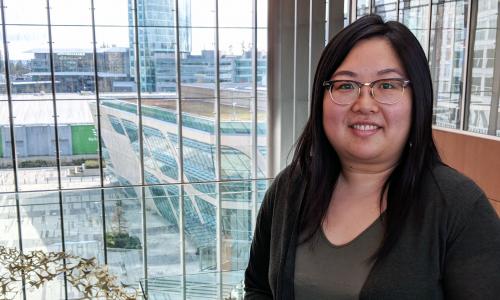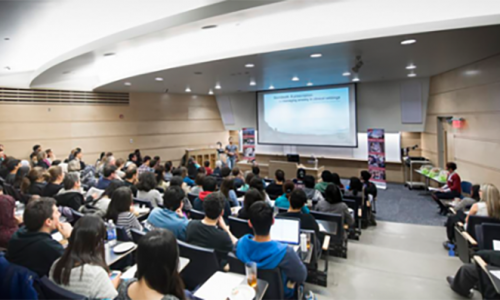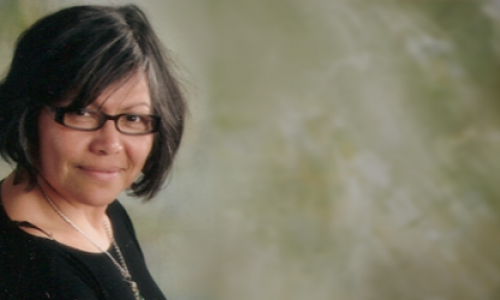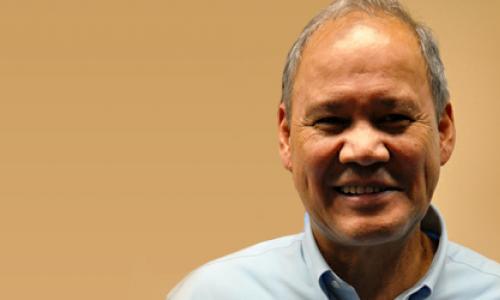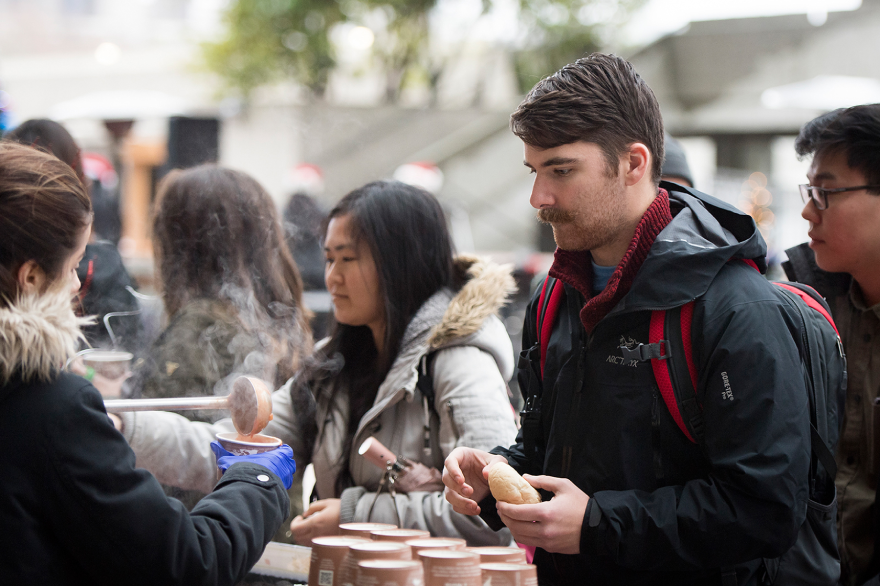
After four months of writing blogs, managing our social media presence, and spearheading my own podcast mini-series — I can’t help but feel this whole co-op experience has just flown by. But, before my co-op semester with SFU’s Vancity Office of Community Engagement (SFU VOCE) comes to a close, I took hold of the wonderful opportunity to speak with both my boss, Am Johal, and colleague, Melissa Roach.
For some background, Am Johal is the Director of SFU VOCE, an organization that provides educational opportunities for local residents, and gives access to artist talks & cultural events within the community. Am is also the Co-Director of SFU’s Community-Engaged Research Initiative, among many other work-based endeavours he pursues on the side.
Melissa Roach is Communications Coordinator at SFU VOCE, with her work here often revolving around “copywriting and graphic design, podcast promotion, and maintaining connections with community partners.” She is also the Co-founder of Grounded Futures, a media production and mentorship collaborative that serves to amplify the ideas and stories of community artists.
The following intertwines Am’s and Melissa’s learnings over the years, and reflects upon working within community-directed organizations like SFU VOCE, or starting your own social projects elsewhere. The knowledge that I gained from the following interviews, brought to light some perspectives and suggestions that I feel are invaluable to any student wanting to help create a more just world.
But to start, creating a “just world” sounds vague — how can we even fit this into a single sector of work, when justice can range from the spaces of art and policy, unionism and urban issues, to social or environmental justice? In my interview with Am, he drew out the phrase ‘community organizing.’
“I don't really have one disciplinary background or profession. But if I had a way to describe the world that I come from, or have solidarity with — its community organizing.”
Throughout our conversation, Am spoke of his whimsical and erratic work-path, “I've worked in different places, non-profits, arts organizations, labour unions — I’ve worked in the political realm, and now, the university.” He spoke of co-developing Humanities 101, his work on the Vancouver Agreement, and his time on the board with Or Gallery — and mentioned how this “erratic” work-path led him to become the Director of SFU VOCE.
“All of the other things that I did before, all of that gave me a range of experience that allowed me to come into a position like this. If I hadn't done all those things, I wouldn't be doing what I'm doing right now.”
And then came a bit of advice that myself, a student, who has always struggled to answer the question ‘so what will you do when graduate?’, will hold with me for years to come.
“Try a lot of things out because you will, with time, gravitate towards the things you love. You might not know what you love when you're 21 or 22. But as time goes on, time is the great truth-teller. And you'll eventually find your spot.”
I learned that sometimes to find where you fit in the world of community organizing, you need to become a bit of a nomad in a sense — with the jobs you take, or the projects you work on. Melissa shared this sentiment in a different form, “there are often certain parts of a job that you will really enjoy. A lot of jobs have many parts to them, and some you might hate, and other parts you might love. So when you come to look for other opportunities, that’s what you should try and focus on — find a job that incorporates the things you love.”
General Tips for Community Organizing
As we continued to reflect, Am and Melissa shared more advice for students — and spoke about what you have to do to be a good community organizer. While their advice was varied, they are summed up by the following.
Beginning with a suggestion that both Melissa and Am offered — do some volunteering. “I there are great opportunities to volunteer with community organizations,” Am said. “There are so many organizations that are looking for voluntary support, be it in housing and social justice work, or in after-school programs — whatever your comfort levels and interests are.”
Melissa further spoke of the benefits of volunteering (or work) in spaces outside of community justice organizing. She touched on her time at the BC SPCA, and her high-school job as a customer service agent for a fishing resort, and spoke of these experiences as giving her valuable social skills and the ability to work in team-oriented environments.
It is worth mentioning that this advice of volunteering does come from a place of privilege — not all of us can spare the time to volunteer while juggling other life commitments, or can’t quite justify our free labour if money is a concern. But it is worth underlining as Melissa did, that even general work experiences can allow you to develop some useful skills.
Sometimes it can be easy to fall into a rut of underappreciating your skills as a student. Am similarly spoke of this, “people will say, ‘I don't have experience, I don't know this or that.’” But to counter this, Am brought up the ability to take advantage of your student status, and let it give you a helping hand. “You do have agency as a student and you can, weirdly, open up doors for yourself by taking an initiative and being in conversation with people — because people are going to open the door to you faster than they might open the door to me… as a student, you can come in asking questions.”
So, take on that role of the astute student, and ask questions to get your foot in the door!
As the last piece of general advice, Am and Melissa spoke of the importance of making connections with community organizers.
“A lot of this type of work is building deep relationships,” Am said, and elaborated on the importance of continually establishing relationships — “because if you're not working with somebody now, you're likely going to be working with them in the future.”
Melissa embellished this point by speaking on some of the ways you can build these relationships. “You need to cultivate your connections. The ways you can do this, is to just find a space of community that's really doing something that you are into, and just show up and throw yourself into it. Whether that's volunteering, or just going to all of their events. Because that's really how you become part of a grassroots community, you show up and you start building relationships.”
Melissa further underscored the importance of building relationships as a notable part of her work-path. Where, several years ago, while working at The Peak, Melissa’s co-worker and friend — who had been working at SFU VOCE, had encouraged Melissa to apply for the communications position she has now. Later in her interview, Melissa also spoke of how she met her colleagues for Grounded Features through SFU VOCE.
This point of building relationships and connections was discussed by both to be highly important — so if you’re going to take away anything from this blog, get that in a to-go box.
Launching Your Own Community Endeavours
Moving away from this more generalized advice, and into the spaces of spearheading your own community projects, they provided further advice.
To start, it’s always best practice to self-reflect, and question your biases or assumptions before you dive headfirst into anything.
“Some really interesting projects happen all the time, but it's important to check yourself and have an ethical framework that you're going to start from. Something that will let you check your blind spots. There are some amazing resources that were produced by Hives for Humanity, and the Manifesto for Ethical Research in the Downtown Eastside — they're all available online. But just in general, having some frameworks are really useful to talk about and think with.”
To summarize these suggestions from Am, just know to familiarize yourself with some frameworks, and have at it with the self-reflection.
You don’t wanna start your homework without going over the assignment criteria — because you’ll likely be taking yourself in the wrong direction.
Similar to ensuring you know the assignment criteria, “when you're starting a new project or program, you need to consider the neighbourhood has its own history.” Am continued, “the neighbourhood or residents might have had a negative experience working with a researcher, a university, or some project might have been tried out five years before already. And what you're putting forward isn't quite new in the way that one might think it might be.”
So do your research first, it’ll set you on a good path right from the start.
Adding to this idea of knowing community history, “talking to the people who are going to be taking the program and learning from them about the best way to set up and structure something,” is something that Am spoke of as integral to spearheading your own project.
To exemplify this, Am spoke of his time developing Humanities 101 — and how the advice he was given from a social organization was to keep the program within the Downtown Eastside, to be more accessible to residents. However, when speaking to the actual members of the Downtown Eastside community, there was a far greater interest in their taking the program at UBC — but they needed some additional resources such as bus passes, or a complimentary lunch in order to do so.
Don’t forget, your target audience is where you’re going to gather the most valuable information — and with that, you can begin determining more concrete directions to go in.
That being said, it is also worth remembering that there can often be disjuncture within groups. As Am mentioned, “a community is made up of people, and people have different viewpoints as well. So speaking to one person doesn't mean that they represent the entire community.”
So it’s important to talk to a lot of people within the community before you set your direction, one or two community members likely won’t cut it.
This final bit of advice from Melissa is more general to starting a podcast in community organizing, and provides some great insight if you don’t know where to begin.
“One way to start, is to just approach it in a DIY way. There are a lot of open-source educational resources for podcasting — you could teach yourself entirely how to do postproduction in Adobe Audition through YouTube. But the way that I've found it to be the most fruitful, has been to have a working relationship with someone who podcasts. And learn from someone who can respond to specific questions that you might have.”
If you don’t know someone in podcasting though, no worries! Melissa offered a solution, and it came back to the main strain of advice we’ve heard earlier — put yourself out there and make a connection. “There are workshops that you can start attending, and that's not just a way to gain skills, but to make connections with people who are doing it.”
If you’re looking for some more specific resources to refer to, check out this guidebook made by the Amplify Podcast Network.
Time to Make Your Path
Reflecting on what I learned from these interviews, my main takeaways are to build relationships, ask questions, and get familiar with the community.
Regardless of where your interests lie, if you want to make community change and find a place in justice work that feels fulfilling to you — be open, make connections, and keep trying new things until you discover your ‘fit.’ In a way, take a “carpe diem” approach — seize that day, take on opportunities as they arise, but also put yourself out there and create some of those opportunities for yourself.










